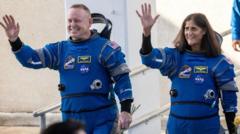When astronauts Suni Williams and Butch Wilmore attempted to dock their Boeing Starliner capsule with the International Space Station (ISS) last year, they encountered unexpected challenges including failing thrusters. This led to uncertainty regarding their return home. "Docking was imperative," Mr. Wilmore emphasized in an interview with BBC News, months after they finally made it back to Earth. Their test flight, initially intended for just eight days, stretched over nearly ten months.
The critical moment came as they sought to safely dock at the ISS. After receiving guidance from Mission Control, they successfully restarted the capsule's thrusters and docked. Wilmore admitted that thoughts about not returning home crossed their minds, but the astronauts chose to focus on problem-solving rather than vocalizing their fears. "We sort of read each other's mind and know where we're going with all the failures," Ms. Williams explained. While the circumstances were daunting, they quickly shifted their focus to problem-solving and utilized the resources available.
Their journey began in June 2024 as part of Starliner's first crewed test flight. Technical difficulties led to Boeing advising against using the Starliner for their return. Instead, the astronauts were transported back to Earth by a SpaceX capsule. Despite uncertainties, Ms. Williams stressed that they felt well supported throughout their ordeal, stating, "We knew everybody had our back and was looking out for us."
During their extended stay in space, political tensions arose domestically, with President Trump criticizing President Biden for their predicament. However, both astronauts were dismissive of the political chatter, focusing instead on their mission and operations.
After two months back on Earth, both astronauts reported feeling fit, crediting their workout routines in a zero-gravity environment for their good condition. Mr. Wilmore stated he engaged in daily heavy exercises throughout his time in space, allowing for an impressive level of strength upon landing. Ms. Williams also expressed the strangeness of readjusting to Earth's gravity, noting the physical discomfort after being in a weightless environment.
Since returning, both astronauts have collaborated with NASA and Boeing to address the issues faced with the spacecraft. Mr. Wilmore expressed optimism for the future of the Boeing Starliner, confirming they would fly in the spacecraft again if the technical challenges are resolved. “It’s a very capable spacecraft,” Ms. Williams reiterated, highlighting its unique features that would benefit future astronauts.
The tales of their unexpectedly long mission not only shed light on the resilience required for space travel but also on the profound impact of technical challenges on human spaceflight endeavors.
The critical moment came as they sought to safely dock at the ISS. After receiving guidance from Mission Control, they successfully restarted the capsule's thrusters and docked. Wilmore admitted that thoughts about not returning home crossed their minds, but the astronauts chose to focus on problem-solving rather than vocalizing their fears. "We sort of read each other's mind and know where we're going with all the failures," Ms. Williams explained. While the circumstances were daunting, they quickly shifted their focus to problem-solving and utilized the resources available.
Their journey began in June 2024 as part of Starliner's first crewed test flight. Technical difficulties led to Boeing advising against using the Starliner for their return. Instead, the astronauts were transported back to Earth by a SpaceX capsule. Despite uncertainties, Ms. Williams stressed that they felt well supported throughout their ordeal, stating, "We knew everybody had our back and was looking out for us."
During their extended stay in space, political tensions arose domestically, with President Trump criticizing President Biden for their predicament. However, both astronauts were dismissive of the political chatter, focusing instead on their mission and operations.
After two months back on Earth, both astronauts reported feeling fit, crediting their workout routines in a zero-gravity environment for their good condition. Mr. Wilmore stated he engaged in daily heavy exercises throughout his time in space, allowing for an impressive level of strength upon landing. Ms. Williams also expressed the strangeness of readjusting to Earth's gravity, noting the physical discomfort after being in a weightless environment.
Since returning, both astronauts have collaborated with NASA and Boeing to address the issues faced with the spacecraft. Mr. Wilmore expressed optimism for the future of the Boeing Starliner, confirming they would fly in the spacecraft again if the technical challenges are resolved. “It’s a very capable spacecraft,” Ms. Williams reiterated, highlighting its unique features that would benefit future astronauts.
The tales of their unexpectedly long mission not only shed light on the resilience required for space travel but also on the profound impact of technical challenges on human spaceflight endeavors.
















